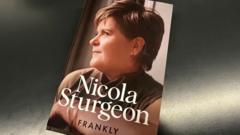What Insights Can We Gain from Nicola Sturgeon's Memoir?

Key Insights from Nicola Sturgeon's Memoir
Nicola Sturgeon's memoir, titled "Frankly," offers a profound insight into the life and times of Scotland's former first minister. Released slightly earlier than anticipated, the memoir has been the subject of considerable discussion due to its candid reflections on her tenure, challenges, and personal struggles. Sturgeon shares a wealth of experiences, from political triumphs to the mental health issues she faced, providing readers with a nuanced perspective on leadership and the personal toll of public service.
The Struggles of Leadership
Sturgeon’s time in office, spanning over eight years and marked by eight election victories, was not without its challenges. As she reflects on her final months in power, she acknowledges that her legacy was overshadowed by contentious debates surrounding gender identity legislation. She describes this period as one of "rancour and division," a sentiment that resonates with many who followed Scotland's political landscape during her tenure.
Gender Self-Identification Legislation
One of the most controversial issues during Sturgeon’s administration was the legislation aimed at simplifying the process for individuals to legally change their gender. In her memoir, she candidly admits to having regrets about how this issue was handled. In hindsight, she wonders if she should have "hit the pause button" to foster a broader consensus among the public and stakeholders. Despite her regrets, she maintains her support for the principle of gender self-identification, illustrating the complexity of balancing personal beliefs with public sentiment.
Handling Controversial Cases
Sturgeon also addresses the case of double rapist Adam Graham, who self-identified as a woman named Isla Bryson. This case became emblematic of the fears surrounding gender identity legislation and significantly impacted public discourse. Sturgeon admits to struggling with how to articulate her position on Bryson's identity, illustrating the difficult intersection of law, identity, and public safety. Her admission of feeling like a "rabbit caught in the headlights" when discussing such issues underscores the pressures faced by political leaders in navigating contentious topics.
Reflections on Personal and Political Relationships
The memoir is rich with personal anecdotes and reflections on Sturgeon’s relationships, particularly with her predecessor, Alex Salmond. Their estrangement, rooted in allegations of sexual misconduct against Salmond, is explored in detail. Sturgeon expresses disdain for Salmond's conspiracy theories regarding his legal troubles, emphasizing the impact of these events on the women involved. This section not only reveals Sturgeon's views on accountability but also highlights her commitment to protecting the integrity of democratic institutions.
The Independence Referendum
Sturgeon recalls the defining moment of her political career: the independence referendum of September 18, 2014. She paints a picture of optimism and determination as Scotland prepared to vote on its future. However, she also candidly shares the immense pressure she felt in campaigning for independence, particularly due to perceived imbalances in media coverage. Her description of moments of despair and panic during the campaign reveals the emotional weight of political leadership.
The Impact of the Pandemic
The COVID-19 pandemic is another pivotal theme in Sturgeon's memoir. She portrays her experience leading Scotland through the crisis as "almost indescribably" difficult. The weight of responsibility took a significant toll on her mental health, leading her to seek professional help for the first time in her life. Sturgeon's reflections on the pandemic highlight the emotional and psychological challenges faced by leaders during unprecedented times.
Misogyny and Personal Struggles
Throughout the memoir, Sturgeon addresses the pervasive misogyny she encountered during her political career. She recounts personal experiences that reveal the insidious nature of sexism in politics. One particularly harrowing story involves a male MSP who taunted her with a derogatory nickname. Sturgeon’s retrospective understanding of this incident as bullying underscores the importance of recognizing and combating misogyny in all forms.
Personal Insights and Vulnerability
Sturgeon’s memoir is not just a political narrative; it is also a deeply personal account. She reveals her struggles with self-doubt, her painful experience of miscarriage, and the challenges of balancing public and private life. Her honesty about her vulnerabilities adds a relatable dimension to her public persona, reminding readers that even influential leaders grapple with personal challenges.
Future Aspirations
As she looks to the future, Sturgeon expresses excitement about the next phase of her life, whimsically referring to it as her "delayed adolescence." She contemplates the possibility of living outside Scotland and even hints at writing a novel. This openness to new experiences reflects her resilience and adaptability in the face of change.
Conclusion: A Legacy to Reflect On
Nicola Sturgeon’s memoir, "Frankly," serves as a compelling exploration of her life, career, and the complexities of political leadership. Through candid reflections on her struggles, triumphs, and regrets, she provides a unique perspective on the challenges faced by women in politics. As she continues to advocate for Scottish independence, her commitment to her beliefs remains unwavering, leaving readers to ponder the future of Scotland and the enduring impact of her leadership.
FAQs
What are the main themes of Nicola Sturgeon's memoir?
The main themes include reflections on leadership challenges, gender identity legislation, personal struggles with mental health, misogyny in politics, and the impact of the COVID-19 pandemic.
How does Sturgeon address her regrets in the memoir?
Sturgeon expresses regrets about her handling of gender identity legislation and the push for a second independence referendum, indicating that she often questioned her decisions in hindsight.
What personal experiences does Sturgeon share in her memoir?
Sturgeon shares her experiences with self-doubt, miscarriage, and the strain of her marriage, providing a deeply personal glimpse into her life beyond politics.
As readers delve into Sturgeon's memoir, they are invited to reflect on the complexities of leadership, the importance of mental health, and the need for empathy in public discourse. What do you think the future holds for Scotland in the wake of Sturgeon's departure from office? #NicolaSturgeon #Scotland #Memoir
Published: 2025-08-12 02:30:23 | Category: technology



